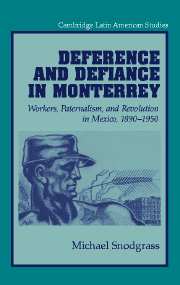Book contents
- Frontmatter
- Contents
- Acknowledgments
- Introduction
- 1 Porfirian Progress in “Mexico's Chicago”
- 2 Revolution Comes to Monterrey
- 3 Work, Gender, and Paternalism at the Cuauhtémoc Brewery
- 4 Making Steel and Forging Men at the Fundidora
- 5 The Democratic Principles of Our Revolution: Labor Movements and Labor Law in the 1920s
- 6 Every Class Has Its Leaders: ASARCO, The Great Depression, and Popular Protest in Monterrey
- 7 Stay with the Company or Go with the Reds
- 8 State Your Position!: Conservatives, Communists, and Cardenismo
- 9 The Quotas of Power: Organized Labor and the Politics of Consensus
- 10 The Persistence of Paternalism
- 11 The Institutionalized Revolution
- Select Bibliography of Primary Sources
- Index
10 - The Persistence of Paternalism
Published online by Cambridge University Press: 19 August 2009
- Frontmatter
- Contents
- Acknowledgments
- Introduction
- 1 Porfirian Progress in “Mexico's Chicago”
- 2 Revolution Comes to Monterrey
- 3 Work, Gender, and Paternalism at the Cuauhtémoc Brewery
- 4 Making Steel and Forging Men at the Fundidora
- 5 The Democratic Principles of Our Revolution: Labor Movements and Labor Law in the 1920s
- 6 Every Class Has Its Leaders: ASARCO, The Great Depression, and Popular Protest in Monterrey
- 7 Stay with the Company or Go with the Reds
- 8 State Your Position!: Conservatives, Communists, and Cardenismo
- 9 The Quotas of Power: Organized Labor and the Politics of Consensus
- 10 The Persistence of Paternalism
- 11 The Institutionalized Revolution
- Select Bibliography of Primary Sources
- Index
Summary
The two forms of industrial relations consolidated during the 1930s – company paternalism and revolutionary unionism – became the most enduring legacies of Cardenismo in Monterrey. The Cuauhtémoc Brewery and the Fundidora steel mill exemplified that outcome, reflecting the divergent ways in which blue-collar regiomontanos and their employers responded to the revolution. The brewery remained an island of class harmony in a sea of industrial conflict. The company reacted to local and national developments by revising its managerial strategies to shield its workers, to the fullest extent possible, from the world of organized labor. It succeeded remarkably well. The brewery operatives upheld their historic mistrust of unions because organized labor offered no preferable alternative to the security of paternalism. Efforts to unionize the plant therefore ran aground on the shoals of company loyalty. The steel workers, on the other hand, became the self-conscious vanguard of organized labor in Monterrey. Local 67's leaders endeavored to defend their sindicato by constructing a lasting union identity among rank-and-file workers. The unity they fashioned within this occupational community made Local 67 a tough bargaining agent at the mill. It also became and remained a union with considerable political clout in Monterrey and within the Mexican Miner-Metalworkers Union. Paternalism nonetheless persisted as an integral part of the steel workers' lives, surviving as both a managerial strategy and in the practices of Local 67 itself.
- Type
- Chapter
- Information
- Deference and Defiance in MonterreyWorkers, Paternalism, and Revolution in Mexico, 1890–1950, pp. 251 - 281Publisher: Cambridge University PressPrint publication year: 2003



